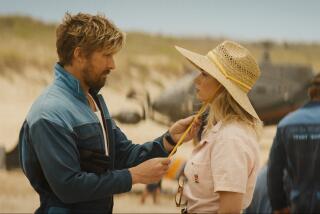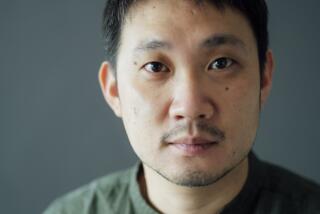Feeling the love
The closer you look at the movies playing in the annual Telluride Film Festival, the more you start to see a trend: Almost all share a long and difficult journey to this remote Colorado mountain town.
Last year’s most prominent Telluride premiere, “Slumdog Millionaire,” which went on to win the best picture Oscar, might be the perfect illustration of this phenomenon -- a movie that scrambled to find financing, was largely rewritten from English to Hindi at the last minute and saw its American distributor close shop just as production wrapped. The rags-to-riches twists at this year’s festival, which wrapped up Monday, may not be as dramatic, but among the roughly two dozen features that premiered were any number of films whose path to the projection booth had been anything but easy -- with festival darling “The Last Station”{C9F197FB-642A-460C-A8FE-4F283BB6D1FD}&BusinessUnitID;={6A60CB CD-9B62-41ED-806C-CCFA1CCC8D06} standing apart for the arduousness of its journey.
Adapted from Jay Parini’s historical novel “The Last Station: A Novel of Tolstoy’s Last Year,” director Michael Hoffman’s movie has been in the works for almost two decades. When Parini’s book about Tolstoy and his relationship with his wife, Sophia, was published in 1990, actor Anthony Quinn believed it not only was the perfect source material for a movie, but also that he should play Tolstoy. The “Zorba the Greek” actor enlisted a then up-and-coming producer, Bonnie Arnold, to shepherd the project, but for every step forward, there was an equal step back. There were any number of screenplay revisions and false starts, but even Quinn’s death in 2001 couldn’t shake Arnold’s belief in the project. “I always thought it would be a good movie,” she said. “So I really didn’t give up, ever.”
Arnold had plenty else on her plate. Having served as an associate producer on “Dances With Wolves,” she had become a top maker of animated features, producing the first “Toy Story” and “Tarzan.” But whenever she made a deal with Disney or DreamWorks (where she produced “Over the Hedge” and next year’s “How to Train Your Dragon”), Arnold made sure she reserved the right to make “The Last Station.”
At one point, Anthony Hopkins was going to play Tolstoy opposite Meryl Streep as Sophia. In another incarnation, Glenn Close was penciled in as the novelist’s progressively more unhappy spouse. “I would contact interested people and there was going to be momentum, and then it lost momentum,” Arnold said. “One person was interested, and then you don’t have the money. Or you had the money, and the person wasn’t available.”
Finally, with Hoffman (“Restoration”) on board to write and direct, and producers Chris Curling and Jens Meurer able to scrape together $18 million from half a dozen German and Russian entities, “The Last Station” went into production in early 2008, nearly 20 years after Quinn had first read the novel and Arnold had agreed to help him transform it into a movie. Helen Mirren was cast as Sophia, Christopher Plummer as Tolstoy and James McAvoy as Tolstoy’s secretary, Valentin Bulgakov.
Playing to sold-out Telluride audiences, “The Last Station” emerged as one of the festival’s most popular films. Now it faces one more critical challenge: finding an American theatrical distributor. “The movie really is a crowd pleaser, and I really hope that a distributor will take note of that and jump on board,” Arnold said.
Other Telluride movies have faced their own hardships and delays and needed particular strokes of luck to end up where they are now.
Writer-director Jason Reitman stumbled across Walter Kirn’s novel “Up in the Air” in 2002 and started writing the screenplay the following year. But he didn’t get a chance to film it until he’d finished “Thank You for Smoking” and “Juno.” Director John Hillcoat’s “The Road” was supposed to come out a year ago, but the production was delayed when nearly two feet of snow prevented Hillcoat from filming near Mt. St. Helens for a critical opening shot, and the movie’s release date may move again (from Oct. 16 to November) to elevate its award chances. Jane Campion, whose John Keats-Fanny Brawne love story “Bright Star” played in Telluride after premiering in May’s Cannes Film Festival, has said she wanted to make a movie about the British poet since she was in high school, and it took her six years to make “Bright Star” her next movie after 2003’s “In the Cut.”
Among the festival’s sneak previews was “Paranormal Activity,””Bright Star” an ultra-low-budget thriller about a demonic haunting that first premiered at the 2008 Slamdance Film Festival. Bought by DreamWorks as a possible remake and then sidelined in the DreamWorks-Paramount breakup, “Paranormal Activity” is now set to come out later this fall.
When producer Jim Stern (“Every Little Step,” “I’m Not There”) agreed to co-finance “An Education,” the period coming-of-age story about a London schoolgirl and an older man, there were any number of reasons why the movie was a long shot.
“It wasn’t the easiest movie to get made for sure,” Stern said of the $15-million production with British actress Carey Mulligan in the lead role. “It was a real leap of faith because you don’t have the cast that will assure you of domestic distribution. There was a lot of interest in foreign sales, but a lot of interest doesn’t always get you a lot of sales.”
But when “An Education” was shown at this year’s Sundance Film Festival, Sony Pictures Classics snapped up the film’s domestic rights for about $1 million. Thanks to its strong showings in Sundance, Berlin and Telluride (the movie plays at the Toronto International Film Festival later this week), “An Education” is now poised to become one of the fall’s art-house hits, and Mulligan is mentioned in many conversations about the lead actress Oscar race.
By one way of thinking, making a Telluride movie is a bit like traveling to the remote festival itself (it took Hillcoat a full day to make it to town from Venice, where “The Road” was playing in the Italian festival): It may be hard to get here, but worth the effort in the end.
--
More to Read
Only good movies
Get the Indie Focus newsletter, Mark Olsen's weekly guide to the world of cinema.
You may occasionally receive promotional content from the Los Angeles Times.







